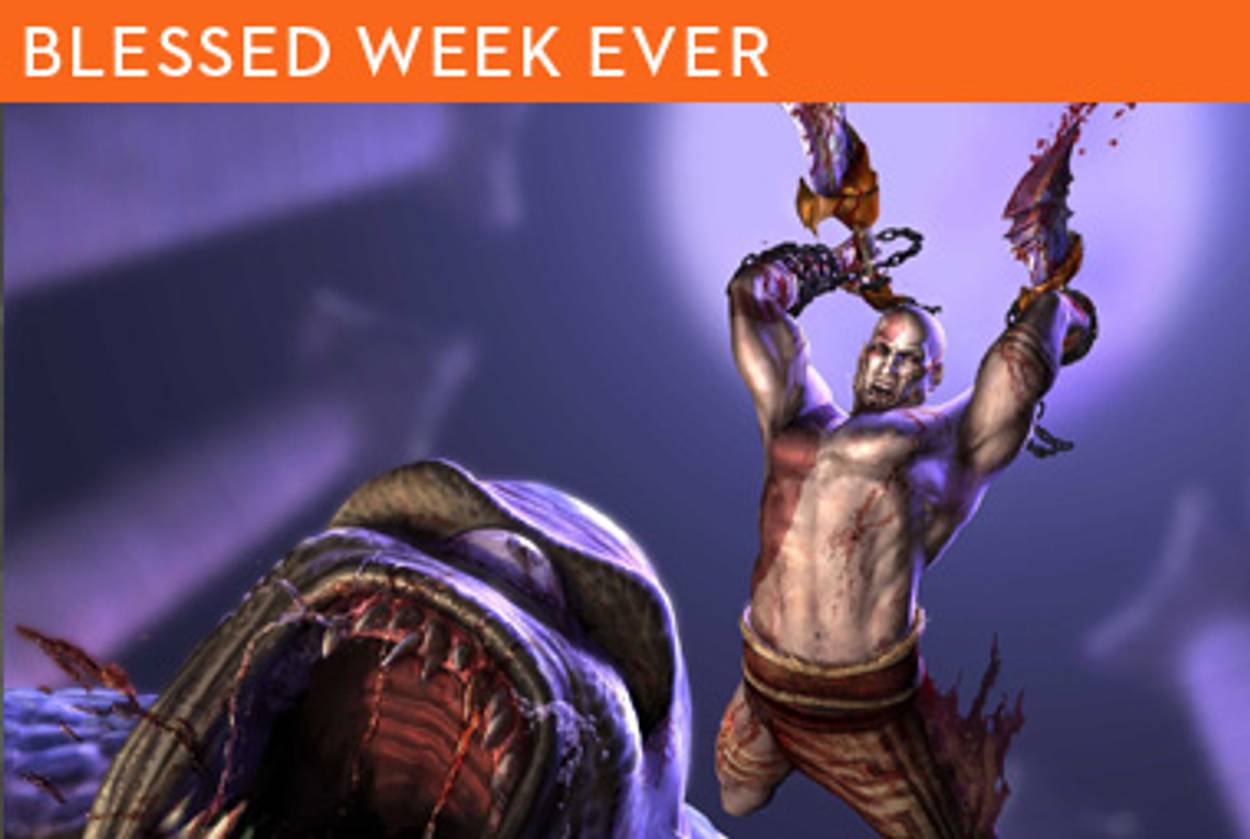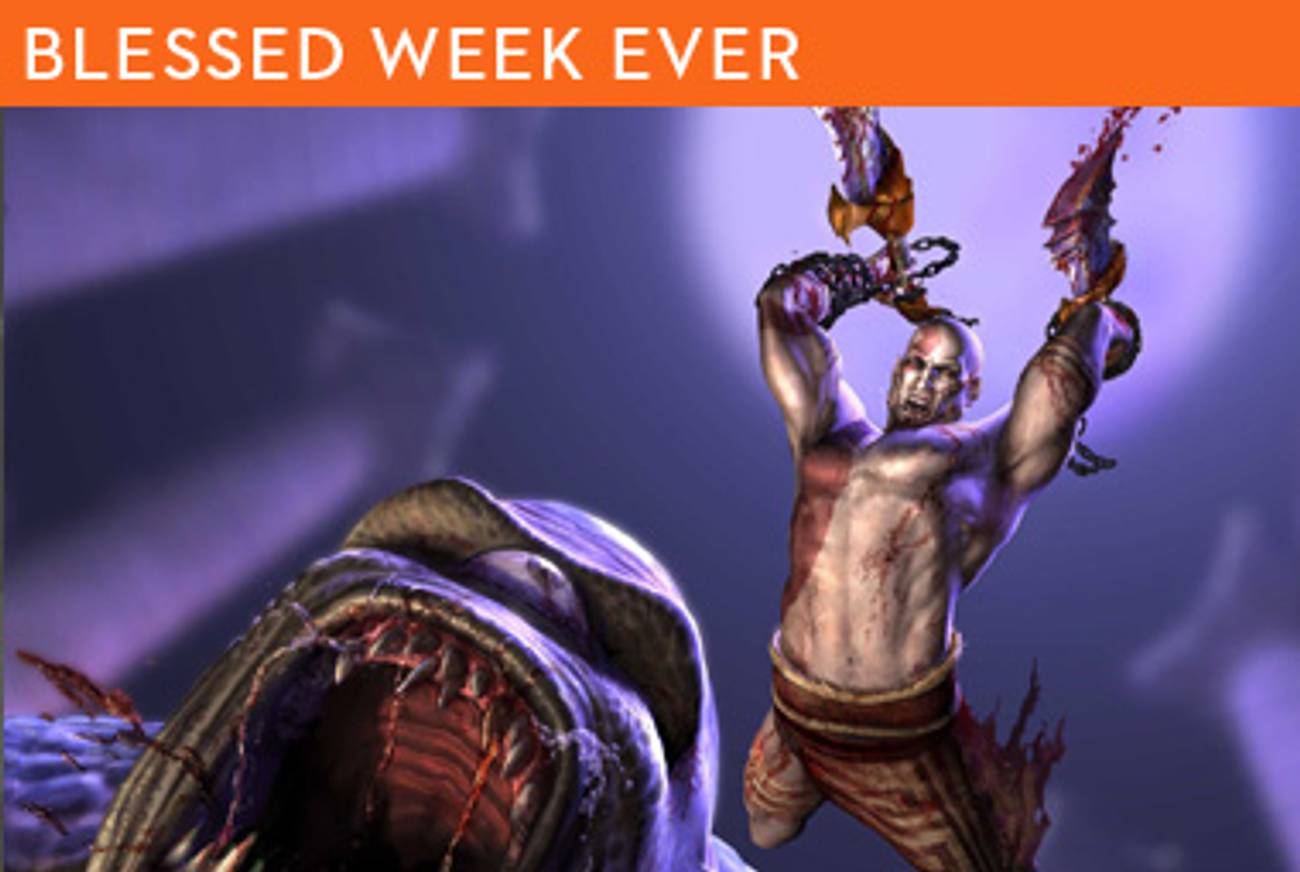Gaming God
A haftorah of video games and vengeance




Whatever its earthly, economic problems, Greece owes me big. This week, I cleansed it of a three-headed Hydra, freed Athens from hordes of the undead, and gave Prometheus a hand with that pesky bird pecking at his liver.
No need to thank me, however. I was just doing my bit. Or rather, Kratos was: He is the protagonist of the God of War video game franchise, the third installment of which, to be released next week, is easily the most eagerly anticipated game of the year.
The premise is simple: As the first game begins, Kratos, a Spartan warrior with Arnold Schwarzenegger’s midriff and Naomi Campbell’s temper, is on a mission to subdue Ares, the God of War. Through a series of frightening flashbacks, we learn that Kratos had once served Ares, an association that led to an abundance of mutilated old ladies as well as to the gruesome deaths of Kratos’s own family members. Haunted by his bloodied past, Kratos seeks revenge on his former boss; eventually, he becomes a god, to the chagrin of many on Mount Olympus who find his scarred face not pretty enough for the pantheon. Deserted and betrayed, poor Kratos must fight the entirety of Greek mythology to clear his conscience and calm his soul.
Both the original title and its sequel have been deservedly celebrated for their elegant gameplay, and guiding Kratos through a bacchanalia of hacking, slashing, severing, and stabbing provides gamers with hours of glorious fun. But the series’ success, I believe, owes more to morality than it does to mayhem.
Consider this: At the end of the first game, Kratos, having finally defeated the evil Ares, begs Athena to honor her word and free him of his nightmares. No can do, says the goddess. Your past sins, she tells Kratos, may be forgiven but they will never be forgotten. Distraught, he leaps off the highest cliff, preferring a crushing death to a life spent in the company of the ghosts of his past. Athena saves Kratos from his fall and crowns him the new God of War. Even as a deity, his demons taunt him still.
It’s a stunning spell of complexity for a medium commonly believed to be all about mindless fun. As we blistered-thumbed devotees know all too well, video games present perhaps the most fascinating arena in current popular culture for the serious contemplation of weighty moral questions.
I realize this is an audacious claim, but a few hours with a controller at hand will convince even the most stony skeptic that there’s real thinking inside the video game box. Sometimes, players get their morality fix indirectly; playing as Kratos, we’re led to believe that if only we kill enough people we’ll forever be rid of our burdens, a belief shattered with each pixilated prowler we slay. Other games demand that we make direct choices that influence the outcome of the game and reveal more than a little about our own dispositions. In Fallout 3, for example, a dystopic action game released in 2008, one particularly brilliant sequence introduces the player to a laboratory controlled by a mad scientist, in which people sleeping securely in special pods dream up virtual scenarios they perceive as real. The scientist in charge, a distorted sadist, demands that the player commit a series of increasingly evil deeds, from breaking up a happy marriage to killing an innocent woman, acts perpetrated in the virtual environment alone that have no real consequences. The player may obey, or he may trigger a certain sequence and bring about the real death of everybody in the laboratory. In the context of the game, the latter option is presented as a mercy killing; no fate is worse than a dormant life of false consciousness dictated by a deranged doctor. And yet people will die. Which is nobler? Which more moral? How we choose makes a world of a difference.
With my knuckles numb from exhaustive play, I turned off the Playstation and picked up the Bible to read this week’s haftorah. In it, the prophet Ezekiel delivers God’s speech to the errant Israelites, promising the Chosen People that even though they had sinned, the Lord will nonetheless redeem them.
“And I will sprinkle clean water upon you,” God promises, “and you will be clean; from all your impurities and from all your abominations will I cleanse you. And I will give you a new heart, and a new spirit will I put within you, and I will take away the heart of stone out of your flesh, and I will give you a heart of flesh.”
I have no idea if God is much of a gamer, but if He is, He’s certainly familiar with the natural progression of video games: You play, you die, you try again. Game over? Press continue, and play until you win.
In a sense, this is the biggest difference between video games and real life, that unhappy parade of days that never allows us the opportunity to relive our grimmest moments until we manage to set everything straight. But video games and life are more similar than we imagine. Ezekiel knows it: This week’s haftorah is meant as an accompaniment to the story of the Golden Calf, and the prophet is reassuring his people that no matter how badly they mess up their covenant with God, the Almighty will always give them another chance at the game, another shot at getting it right.
It must be so: Unless we’re allowed to play and play some more, we could never reach perfection, and in life, just like in video games, the only way to get it right is to keep on trying. Just ask Kratos.
Liel Leibovitz is a senior writer for Tablet Magazine and a host of the Unorthodox podcast.
Liel Leibovitz is editor-at-large for Tablet Magazine and a host of its weekly culture podcast Unorthodox and daily Talmud podcast Take One. He is the editor of Zionism: The Tablet Guide.